Iran’s Presence In Syria Directly Ordered By Khamenei: Insider
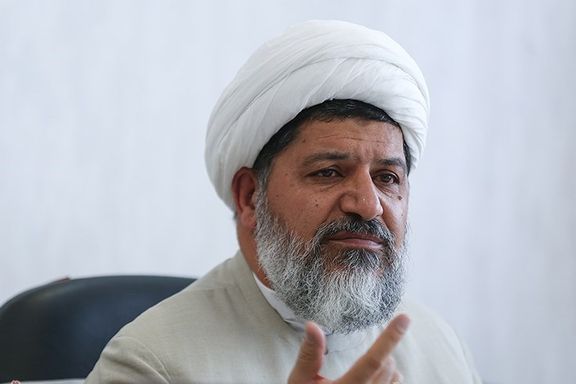
An Iranian regime insider says Iran’s military presence in Syria for many years was directly ordered by Supreme Leader Ali Khamenei.

An Iranian regime insider says Iran’s military presence in Syria for many years was directly ordered by Supreme Leader Ali Khamenei.
Ali Shirazi, the former representative of Khamenei in IRGC's Quds Force said Wednesday that “when the Supreme Leader ordered former Quds Force commander Qassem Soleimani to go to Syria, he did not argue. He went and resisted firmly.”
“However, [other] officials including then-President Mahmoud Ahmadinejad did not believe we should go to Syria and fight against ISIS,” he added.
Shirazi’s comments about fighting ISIS contradict the fact that when Iran intervened in the Syrian civil war in 2011 the Islamic State group did not exist yet. Iran sent thousands of fighters and weapons to defend the government of Bashar al-Assad.
ISIS gained a foothold in Syria after the group seized large swaths of territory in Iraq in mid-2014.
Soleimani intervened in Syria as opposition to Assad was gaining momentum. He first played the role of an advisor to the government, but later he spearheaded Iran’s large-scale military intervention in the civil war. Many believe he was responsible for the deaths of thousands of civilians and call him the child-killing commander.
Soleimani was killed in Baghdad along with nine others in 2020 by a drone strike ordered by then-President Donald Trump.
The Qods Force under Soleimani became deeply involved in the conflicts in Syria and Iraq. Trump claimed that the general, who was Iran’s main operative in the Middle East, was killed because he was planning attacks on US troops.
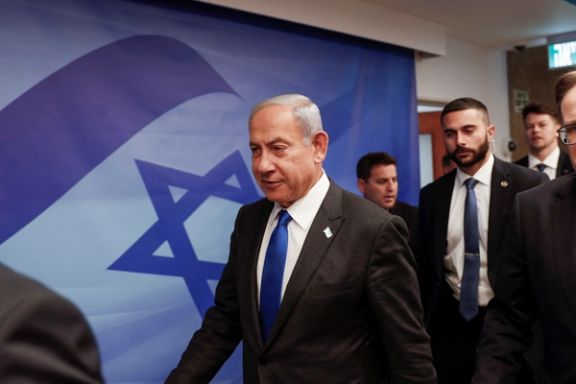
The “most hawkish” security cabinet Israel has known was announced Tuesday as Benjamin Netanyahu promised a new strategy against Iran.
At the first meeting of the wider, 31-person cabinet, Netanyahu said he would “work more vigorously to prevent Iranian-military entrenchment in Syria and elsewhere” and that he would step up opposition to efforts to revive the 2015 Iran nuclear agreement, the JCPOA (Joint Comprehensive Plan of Action).
Some Israeli media play up a warm relationship between Netanyahu and United States President Biden, arguing the Israeli prime minister has little to fear over JCPOA revival. Israel Hayom, the free Israeli newspaper owned by the family of US Republican Party ‘kingmaker’ Sheldon Adelson, claimed Antony Blinken, the US Secretary of State, told new Israeli Foreign Minister Eli Cohen in a 40-minute phone-call that the JCPOA was finished, and that the US wanted the European Union to step up sanctions against Iran.
A leading member of the 11-member security cabinet – Itamar Ben Gvir, the national security minister and leader of Otzma Yehudi (Jewish Power) – earlier in the day visited the Temple Mount, sparking memories of the September 2000 visit by Ariel Sharon that led to the so-called second Palestinian intifada. The site, which contains both the temple and the al-Aqsa Mosque, has been occupied by Israel since the 1967 war.
European Union foreign policy chief continued efforts in December over the JCPOA, meeting Iranian foreign minister Hossein Amir-Abdollahian in Jordan, and the EU now faces a quandary heightened by several European countries sanctioning Iran over its dealing with current unrest or military links with Russia.
US ‘maximum pressure’ sanctions on Iran were introduced in 2018 when former President Donald outlined a range of demands of Iran, including ending any uranium enrichment and stopping support for militant proxy groups. But while the sanctions badly affected Iran’s economy, Tehran rejected the US demands and has increased its nuclear program beyond JCPOA limits.
‘The sphere of global opinion’
While Europe welcomed Biden’s commitment, on taking office in 2021, to restore the JCPOA, neither multilateral talks with world powers nor bilateral US-Iran contacts have bridged gaps. While Biden has continued the sanctions ostensibly to secure JCPOA revival, it emerged in December that he had in November described the JCPOA as “dead.”
While the latest Israeli military intelligence report favors efforts to reach an international agreement over Tehran’s nuclear program, Netanyahu, who has argued since the 1990s that Iran was close to acquiring a nuclear weapon, told the cabinet Tuesday that Israel would work not only “with leaders behind closed doors but strongly and openly in the sphere of global opinion” to prevent the remaining “possibility” that the JCPOA could be revived. “Global opinion” was “now aware of the true dangers posed by Iran – the Iranian regime that is killing innocent citizens in and outside Iran,” he said.
The Times of Israel reported that even if Likud Party members on the security cabinet “watered down” the influence of Gvir and Bezalel Smotrich, leader of the Religious Zionism Party, this was still “among the most hawkish the country has ever known, reflecting the radical-right makeup of the new government.” During his Knesset tenure Ben Gvir set up an office in Sheikh Jarrah quarter, Jerusalem, where Palestinian Christians are resisting eviction, and has called on Israeli police to open fire on protestors.
While media attention in Israel is focused on Netanyahu’s plans for judicial reform or his promise of a broad front against Iran, Palestinian parties are concerned that the new government will speed up and extend Jewish settlements in the West Bank. United Nations experts in December condemned “rampant Israeli settler violence and excessive use of force by Israeli forces,” and the UN General Assembly last Friday voted to seek an opinion from the International Court of Justice (ICJ), the UN’s highest court, on Israeli occupation of Palestinian land.
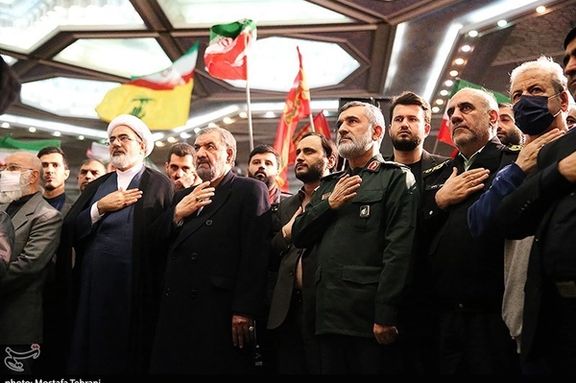
The Iranian Foreign Ministry says the US killing Qassem Soleimani. former commander of IRGC's Quds Force in 2020 failed in bringing Washington its desired outcome.
In a tweet on Tuesday, the foreign ministry claimed Iran continues “to play a decisive role” in the region and the United States’ “footprint in West Asia continues to diminish”.
The tweet was published on the eve of the third anniversary of Soleimani’s killing by the United States.
On January 3, 2020, the US military, on the order of President Donald Trump, killed Soleimani in a drone strike near Baghdad International Airport, saying that he had been "actively developing plans to attack American diplomats and service members in Iraq and throughout the region."
In a Monday statement, the Iranian regime also claimed that Washington conducted the killing of Soleimani with "false claims and pretexts, including under the guise of counter-terrorism" and in "naked violation of the tenets and principles of international law."
Iranian Foreign Minister Hossein Amir-Abdollahian said on Sunday that nearly 60 US officials have been blacklisted by Tehran for their involvement in the assassination of Soleimani.
Iran’s President Ebrahim Raisi and Supreme Leader Ali Khamenei have time and again vowed revenge for the killing of Soleimani.
Raisi in a speech on Tuesday addressed the US saying, “We have not forgotten martyr Soleimani’s blood and will never forget. They [Americans] should know that revenge for Soleimani is certain and his killers…will not have any peaceful sleep.”
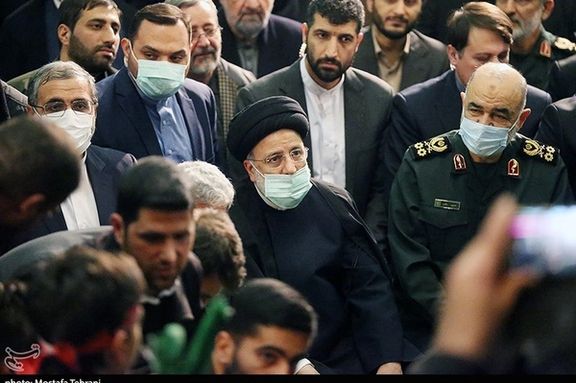
At the same time, many Iranian regime opponents and activists on social media celebrated Soleimani’s killing anniversary, calling it a “Cutlet Day”, after a popular Iranian dish made of ground beef and potatoes. Soleimani’s body was so mutilated in the attack that his detractors came up with the comparison to the meat and potato patties.
Some activists said that if Soleimani was alive he would have ordered a more brutal response to the current protests and would have had no reservations about killing thousands of people. They accused him of playing such a role in past protests and engineering Iran’s bloody military intervention in Syria against anti-Assad rebels, when hundreds of thousands of people were killed, injured and left homeless.
Protesters in Iran burned many banners erected in Soleimani’s honor this week and set fire to several of his statues.
A member of Iranian Revolutionary Guard was charged in August with planning to assassinate John Bolton, the former United States National Security Advisor in what the US Justice Department called “retaliation for the death of Iran’s Islamic Qasem Soleimani”.
Former Secretary of State Mike Pompeo was also told by the Justice Department that he was a second target of the plot.
Soleimani, who was Iran’s top military and intelligence operator outside its borders, was in charge of supporting and organizing militant proxy forces, including the Lebanese Hezbollah and Iraqi Shiite militia groups that have repeatedly attacked US forces.
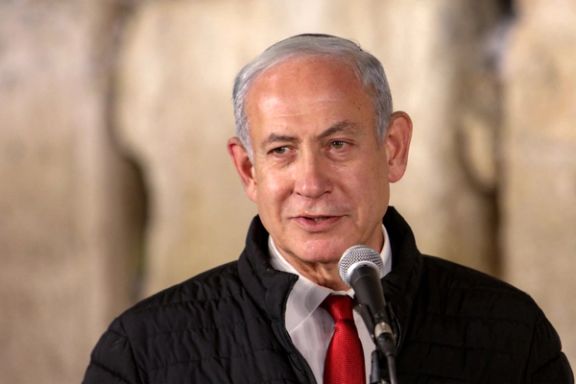
Israel’s new ministers are touting their relationship with the United States, with foreign minister Eli Cohen promoting a broad front against Iran.
Cohen said Monday that the “international community must stop burying its head in the sand when it comes to Iran,” and that Israel should “stop Iran from attaining nuclear capabilities in every way.”
Cohen said the new government led by Benjamin Netanyahu aimed to “deepen ties with European countries and to bolster them compared to past years.” He brushed off any human rights concerns in Europe, attacking Friday’s United Nations General Assembly resolution that sought an advisory opinion from the International Court of Justice (ICJ), the UN’s highest court, on Israeli occupation of Palestinian land. Cohen also dismissed the prospect of Israel facing war crimes suits at the International Criminal Court, which Israel and the US do not recognize. Washington voted against the resolution, which passed 87-26.
Some of the Israeli press has made much of the personal relationship between Netanyahu and US President Joe Biden. Last July, when Biden arrived for his trip to Israel, he told Netanyahu, then in opposition, “You know that I love you.”
While the latest Israeli military intelligence report favors efforts to reach an international agreement over Tehran’s nuclear program, Netanyahu has long rejected such a course, and strongly supported former US president Donald Trump withdrawing from the 2015 Iran nuclear deal, the JCPOA (Joint Comprehensive Plan of Action). While Biden came into office committed to restoring the JCPOA, any tensions over this with Netanyahu are likely to soften as Biden officials place no ‘focus’ on JCPOA talks and extend sanctions on Iran.
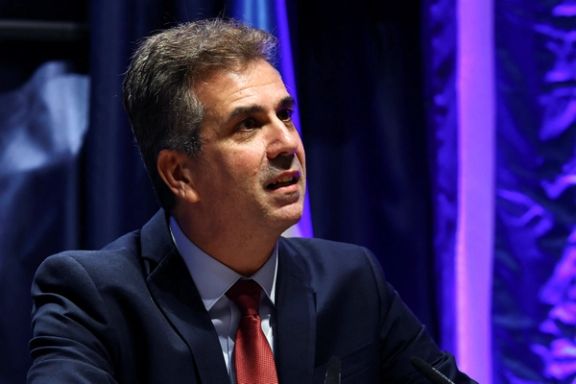
Netanyahu has also said he wants to extend Israel’s Trump-brokered ‘normalization’ agreements with some Arab states, stressing an Iranian threat. But he is unlikely to convince Saudi Arabia since his government now includes ultra-Zionists committed to speeding up Jewish settlement in occupied Palestinian territory. Riyadh voted Friday in favor of the UN resolution referring Israel to the ICJ.
‘Significant contribution to regional stability’
Cohen said Monday he would meet in March in Morocco with counterparts from the ‘normalized’ states – Morocco, United Arab Emirates, Bahrain and Sudan. This would, he said, develop “a significant contribution to security (and) regional stability.” The Times of Israel reported Tuesday that Netanyahu planned to visit the UAE officially for the first time, possibly next week.
After European Union foreign policy chief Josep Borrell highlighted in December dim prospects for the JCPOA, Ali Bagheri Kani, a deputy Iranian foreign minister and Tehran’s lead nuclear negotiator, said Tuesday Tehran would “continue serious and effective cooperation” with the International Atomic Energy Agency (IAEA).
One challenge in JCPOA talks has been Tehran’s demand that the IAEA close an enquiry into uranium traces found at ‘non-nuclear’ sites, an enquiry Iran says followed accusations made by Netanyahu in 2018 but which the agency says concern Tehran’s ‘safeguards’ obligations under Nuclear Non-Proliferation Treaty.
‘The ball in the Western court’
The US and western European states successfully moved resolutions in June and November at the IAEA governors’ board censuring Iran over its approach to the agency, but Russia and China argued this is counterproductive given the main responsibility for JCPOA restoration lies with the US as the party that abandoned it. Russia’s IAEA ambassador Mikhail Ulyanov tweeted Tuesday that “the ball” was in “the Western court.”
Bagheri Kani offered his views on the JCPOA at a ceremony marking the third death anniversary of Iranian general Qasem Soleimani, killed in Baghdad along with nine others January 3, 2020, by a US drone strike. Bagheri Kani stressed Soleimani’s success in “building power by relaying on the capacities in the region” so making “terrorism fail” – referring to the commander’s role mobilizing Iraqi forces against the Islamic State group (Isis, or Daesh).
Bagheri Kani repeated Tehran’s previous threats that the foreign ministry and judiciary were continuing, along with Iraq, to follow routes under international law against “the agents of the assassination” of Soleimani, whose death the UN special rapporteur called ‘unlawful killing.’ The deputy foreign minister gave no details.
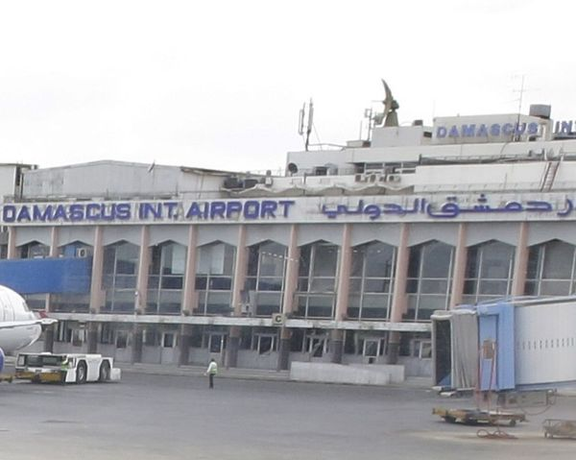
Israeli air strikes targeting Iran-linked assets in Syria have been concentrating on airports as the Islamic Republic is trying to step up its presence while Russia is focusing on Ukraine.
The Syrian army said on Monday that a volley of air-launched missiles, coming from the direction of Lake Tiberias in Israel, hit the Damascus International Airport at 2 am local time and briefly put the airport out of service.
Missiles also hit targets in the south of Damascus, killing two members of the Syrian armed forces and causing some damage, the army said. Earlier, two regional intelligence sources said the strikes had hit an outpost near the airport of the Revolutionary Guard’s Quds Force -- a division primarily responsible for extraterritorial military and clandestine operations – and its affiliated militias.
Last year, Israel intensified strikes on Damascus International and other civilian airports to disrupt Tehran's increasing use of aerial supply lines to deliver arms to allies in Syria and Lebanon, including Hezbollah. Syria halted flights to and from the airport in June for nearly two weeks after Israeli strikes caused extensive damage to infrastructure.
Since late in November, Syria and Iran have been deploying new air defense systems, including jamming and early warning systems, around Damascus to prevent Israeli airstrikes in the area. There are reports that the new systems were built by Korean and Chinese companies and provided by Iran as part of agreements reached between Damascus and Tehran.
On Monday, Iran's foreign ministry spokesman Nasser Kanaani decried the Israeli attack on Damascus airport, calling on the global community to condemn the violation of Syrian territorial integrity. “We were informed that the Damascus airport was hit by the Zionist regime; this action is condemned in our opinion and the United Nations and other institutions should condemn these aggressions,” he said.
Last week, a report by Asharq Al-Awsat said Iran is seeking to revive the expansion of its presence near Damascus, something it has always sought to do but was previously prevented by Russia. According to the report, the Islamic Republic’s objective is to create another “southern suburb”, commonly known as Dahieh, like the Hezbollah-dominated suburb of the Lebanese capital Beirut.
Now the landscape has changed as Russia seems to be needing its forces for the invasion of Ukraine, so it is evacuating the region with coordination of the Islamic Republic, which is supplying Moscow with drones and missiles to be used in against the Ukrainians.
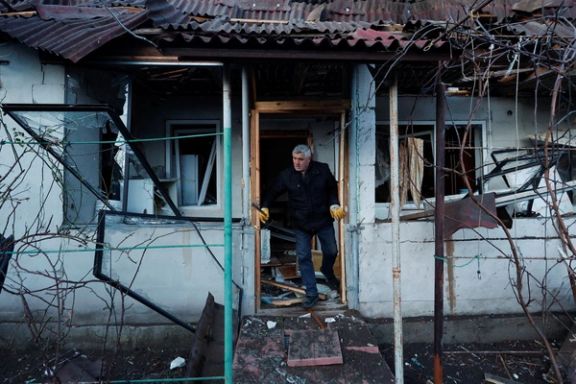
Also on Monday, a salvo of Iranian-made Russian drones targeted infrastructure in Ukraine's capital and surrounding areas, damaging energy facilities and causing some power outages, officials said.
Ukraine’s air force said that its air defense systems destroyed all of Russia's 39 Iranian-made Shahed drones that targeted Ukraine overnight in what it said was a “massive attack”.
"Russians launched several waves of Shahed drones. Targeting critical infrastructure facilities. Air defense is at work," Kyiv Governor Oleksiy Kuleba said.
Kyiv Mayor Vitali Klitschko said 40 drones “headed for Kyiv” overnight. Klitschko said 22 drones were destroyed over Kyiv, three in the outlying Kyiv region and 15 over neighboring provinces.
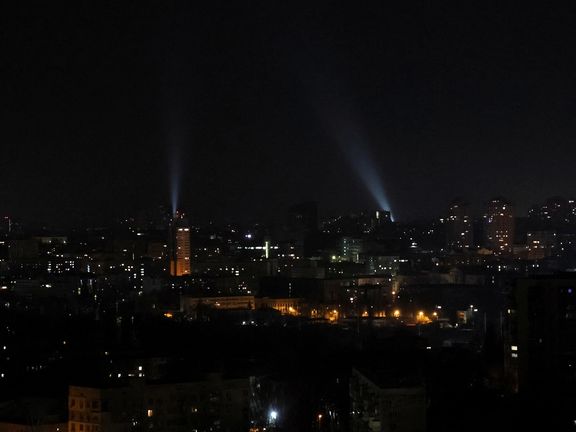
Iran claimed Monday that Ukraine has never submitted any proof of Iranian-made drones being used by Russia in the war, as Russia launched another large attack.
Ukraine said waves of Iranian-made Russian drones targeted infrastructure in Kyiv and surrounding areas on Monday, damaging energy facilities and causing some power outages, officials said, as Russia extended its bombardment into the second day of 2023.
Ukraine’s air force said that its air defense systems destroyed all of Russia's 39 Iranian-made Shahed 131 and 136 drones that targeted Ukraine overnight in what it said was a “massive attack”.
Iran’s foreign ministry spokesman Nasser Kanaani in his weekly briefing implicitly denied the use of Iranian-made drones and said Kyiv has never produced any evidence.
Ukraine said December 13 that it provided Iran with the evidence. "We are not surprised by yet another objection from Iran regarding the supply of weapons to Russia. During the technical meeting, Ukrainian experts provided the Iranians with the sufficient evidence," Foreign Ministry spokesman Oleg Nikolenko said during an interview with Kyiv-based news agency Interfax-Ukraine.
Iran’s decision to supply weapons to Russia has played a major role in the deterioration of its already frayed ties with Europe that has put nuclear talks with Tehran on the back-burner since evidence emerged of the kamikaze drones being launched by Russia in October.
Kanaani also spoke about these talks, having little to offer as a sign of any positive movement. After 18 months of negotiations to revive the 2015 nuclear accord known as the JCPOA the talks broke down in early September. The United States has said i tis not focused on the diplomatic effort any more because Iran presented last-minute extraneous demands.
Meanwhile, nationwide antigovernment protests in Iran have posed the most serious challenge to the Islamic Republic in its 43year history, with the economy in serious trouble. Consequently, Tehran has been showing renewed interest in reviving the nuclear talks, because the process, if successful, could end harsh US sanctions and bring a much-needed financial relief to the embattled regime.
Kanaani insisted that Iran is ready to conclude the nuclear talks based on a draft agreement prepared "after months of difficult talks," referring to what the European Union submitted in August to all sides to wrap up the negotiations. It was at this juncture when Tehran and Washington were giving their feedback to the draft that talks came to a standstill.
Kanaani also tried to put a positive spin on chances of improving relations with Saudi Arabia and Egypt, amid its regional isolation. Iran was not even invited to tripartite defense talks between Russia, Turkey and Syria last week, although it is a major player in the Syrian conflict. It has also not been invited to a similar meeting of foreign minsters to take place in the second half of January.
Asked about why Iran has not been invited, Kanaani simply replied that "Russia, Turkey and Syria are well aware of Iran’s decisive role in the fight against terrorism in Syria and its support for the people and the government [of Syria]".